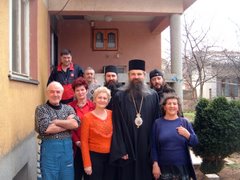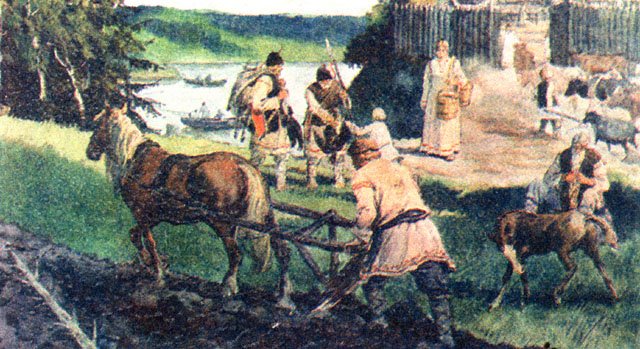St. Simeon of Russia
1. THE VENERABLE SIMEON [MIROTOCIVI], FROM WHOSE RELICS FLOWED MYRRH - CHRISM
Stefan Nemanja [Nehemiah], the great ruler [Great Zupan] of the Serbian people, the consolidator of Serbian lands, creator of the independent Serbian state, defender of Orthodoxy and exterminator of heresy. At first, he was baptized in the Latin Church but later left this Church and embraced the Orthodox Church. In the beginning, he was dependent on the Greeks with regard to the State, but later he freed himself from this dependence and became completely autonomous. When Stefan consolidated the State and the Orthodox Faith in the State, then, following the example of his son Sava, received the monastic tonsure in Studenica Monastery in the year 1195 A.D., and received the name Simeon. His wife Anna withdrew to a convent, embraced the monastic tonsure and received the name Anastasia. After two years as a monk in Studenica, Simeon traveled to Athos, the Holy Mountain. There he took up residence in the Monastery Vatopedi together with his son Sava. Father and son spend their days and nights in prayer. There, they built six chapels dedicated to: the Savior, The Unmercenary Saints, St. George, St. Theodore, The Forerunner and St. Nicholas. They purchased the ruins of Hilendar and erected a glorious monastery in which Simeon lived only eight months and then died. When Simeon was on his deathbed, Sava, according to his father's wishes, placed him on a simple mat. With eyes directed toward the icon of the Mother of God and the Savior, the blessed elder spoke these last words: "Let everything that has breath praise the Lord." (Psalm 150:6), and took up habitation with the Lord on February 13, 1200 A.D.
2. THE VENERABLE MARTINIAN
The glorious and most wonderful life of Martinian is worthwhile to read in its entirety. What did he not endure just to fulfill the commandments of the Lord! At age eighteen, Martinian retreated to a mountain in Cappadocia called "The Place of the Ark" where he lived for twenty-five years in fasting, vigils, prayer and struggling with many temptations. When a woman came to tempt him and, he perceiving that he will succumb to sin with her, Martinian leaped into the fire barefooted and remained in the fire until the pain brought tears to his eyes and subdued any lust within himself. When another temptation erupted, Martinian fled to an isolated rock in the sea and there he lived. During a shipwreck a young woman swam to this rock. Martinian jumped into the sea to avoid any further temptation, but a dolphin rescued him on its back and by God's Providence brought him ashore. Martinian then decided never to make any place his permanent home but to continually travel. In two years, Martinian passed through one hundred and sixty-four towns correcting and counseling people. He finally reached Athens where he died in the year 422 A.D.
3. THE FEMALE SAINTS ZOE AND PHOTINA
At first Zoe was a prostitute and a temptress of St. Martinian. When she saw this ascetic leap into the fire in order to subdue in himself all lust, she bitterly repented, retreated to a convent in Bethlehem where, as an ascetic and recluse, heroically lived a life of mortification. Repenting of all her sins, she received from God the gift of working miracles. By the winds of the sea St. Photina was cast on the island where St. Martinian had isolated himself. Martinian immediately fled the island and Photina remained there in fasting and prayer where she died.
HYMN OF PRAISE
SAINT ZOE
The monk in the fire, Zoe looked at with horror
How he burns without complaint, fear and sighing!
With horror and with shame, Zoe repented:
Just to save his soul, O what this man does!
Bowed and begged forgiveness, she began to weep,
To resist evil, asked, what to do,
To save the soul, to resist evil in the flesh.
The man of God, from joy, he too began to weep.
To Bethlehem, to the blessed Paula he sent her:
Depart woman, save yourself; go and do not perish,
Blessed Paula, all else will tell you.
Over the turquoise sea, completely humbled, Zoe departed,
Like a little sister, Paula received and instructed her.
Zoe cries, Zoe listens; endures and remains silent.
So twelve summers passed; twelve years,
As an ascetic, Sister Zoe became known.
Bathes her face with tears and before her death asks God,
Has God forgiven her? Did He or did He not?
At that moment, before the door of Zoe, a blind woman was led
That she may see; You pray, pray, pray!
In tears, Zoe prayed and the woman saw;
Zoe recognized, thus recognized that she is forgiven
Through sinners, when they repent, God is glorified,
Then, they on earth, with miracles shine like the stars.
REFLECTION
The great Stefan Nemanja, whose authorative words everyone unconditionally heeded to and at whom people and emperors trembled, became a monk and served the monks of the Holy Mountain [Athos] as an ideal example of meekness, humility, goodness and piety. Even his death was the death of a truly godly-man and spiritual director. He became bedridden on February 7. He summoned St. Sava, placed his hands on him and blessed him saying: "My beloved child, the light of my eyes, comfort and protector in my old age! Behold the time of our separation has arrived. Behold the Lord is releasing me in peace. But you, my child, do not mourn because of our separation. For parting is the common cup of all and everyone; here we part from one another but we will meet there where there is no separation." On February 12, St. Simeon asked Sava to clothe him in a burial cassock, to spread a mat on the ground, lay him there and place a stone under his head. He then summoned all the monks and asked their forgiveness. At dawn, on February 13, while the monks were chanting the Office of Matins in church and the voices were reaching the cell of the dying one, St. Simeon, once more his face radiated and he gave up his soul to his God.
CONTEMPLATION
To contemplate the Lord Jesus as the Lamb of God:
1. As a Lamb born in the dwelling place of lambs;
2. As a Lamb persecuted by men of lupine temper such as Herod and others;
3. As the Sacrificial Lamb Who patiently endured pain and death;
4. As the Victorious Lamb of God on the Heavenly Throne.
HOMILY
About love above every other love
" Whoever loves father ormother more than Me is not worthy of Me" (St. Matthew 10:37).
The entire Gospel teaches that we should leave the lesser for the sake of the greater; the transient for the intransient; the worst for the sake of the best; the less valuable for the sake of the more valuable. If the Good News [Gospel] would not promise greater value, who would leave the lesser? If the Gospel would not reveal the glow of the precious goods, who would leave the less valuable goods? Who would leave honey and milk if he did not find something sweeter? Who would leave father and mother if he did not find someone closer in kinship? Who would leave children and friends if he did not recognize someone more dear? Who would willingly give up his life to suffering and death if he did not perceive immortal life? The Lord Christ is sweeter than honey and milk; He is a closer kin to us than our father and mother; more dear to us than our own children and friends; more precious than all visible treasures; more costly than this life for He gives life eternal. Everything in the world compared to Him [Christ] is inferior, trivial, bitter, weak, less valuable and transitory. Whoever receives Him [Christ] it is easier for him to leave everything; everything, because he has received the best and Him Who is the very best.
O Lord Jesus, the Treasury of all eternal riches, help us to unbind ourselves from everything and to cling to You, our Good and our Life.

















